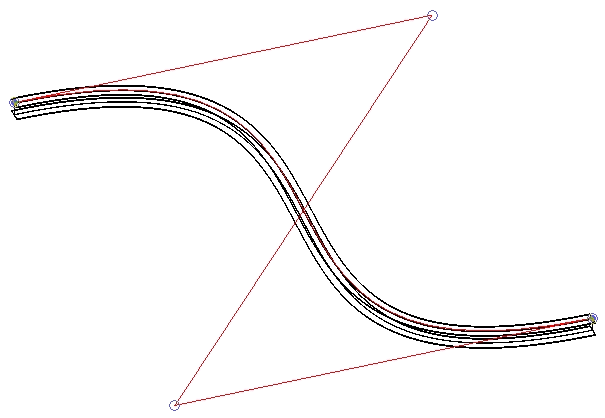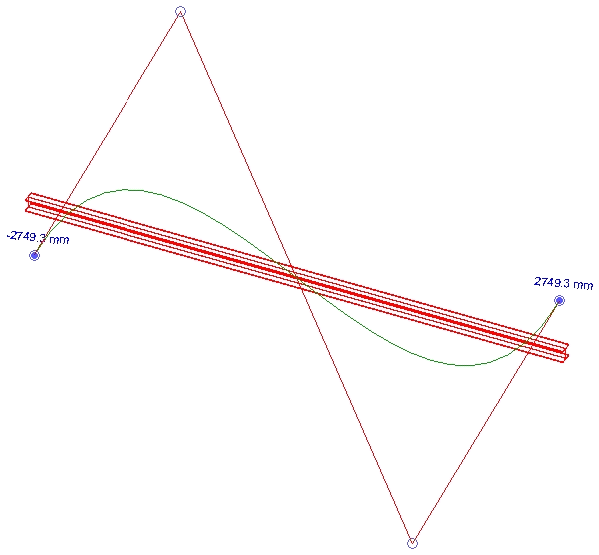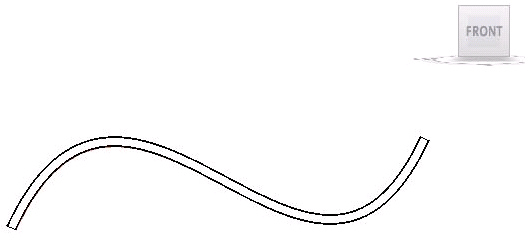Creating a Curved Beam
Here is a solution from my colleague Joe Ye on how to create a curved beam. This is also the first and so far only Building Coder sample that demonstrates the use of the Revit API DoubleArray and NurbSpline classes.
Question: I am creating curved beams using NURBS. When the spline in parallel to the XY plane, all works well:

When the curve is lying in the YZ or XZ plane, however, the resulting beam is straight:

How can I create the correct curved beam in all orientations?
Answer: This was actually a known issue in Revit 2009, and has been fixed in Revit 2010. I tested creating a nurbs-defined curved beam in the XZ plane in 2010 and it works well. Here is the resulting shape in front view:

This is the code of the Execute method used to create this beam, using a set of points in the XZ plane:
Application app = commandData.Application; Document doc = app.ActiveDocument; Level level = doc.ActiveView.Level; FamilySymbol symbol = null; string path = "C:/Documents and Settings" + "/All Users/Application Data/Autodesk" + "/RST 2009/Metric Library/Structural" + "/Framing/Steel/"; string family = "M_WWF-Welded Wide Flange"; string ext = ".rfa"; string filename = path + family + ext; string symbolName = "WWF600x460"; if ( doc.LoadFamilySymbol( filename, symbolName, out symbol ) ) { Curve c = CreateNurbSpline( app ); FamilyInstance inst = doc.Create.NewFamilyInstance( c, symbol, level, StructuralType.Beam ); return IExternalCommand.Result.Succeeded; } else { message = "Couldn't load " + filename; return IExternalCommand.Result.Failed; }
The important step is the call to the CreateNurbSpline method, which generates the required input curve from a set of hard-coded points. Here is the definition of that method:
NurbSpline CreateNurbSpline( Application app ) { XYZArray ctrPoints = app.Create.NewXYZArray(); XYZ xyz1 = new XYZ( -41.8 * 1, 0, -9.02 * 1 ); XYZ xyz2 = new XYZ( -9.2 * 2, 0, 0.82 * 50 ); XYZ xyz3 = new XYZ( 9.2 * 2, 0, -0.82 * 50 ); XYZ xyz4 = new XYZ( 41.8 * 1, 0, 9.02 * 1 ); ctrPoints.Append( xyz1 ); ctrPoints.Append( xyz2 ); ctrPoints.Append( xyz3 ); ctrPoints.Append( xyz4 ); DoubleArray weights = new DoubleArray(); double w1 = 1, w2 = 1, w3 = 1, w4 = 1; weights.Append( ref w1 ); weights.Append( ref w2 ); weights.Append( ref w3 ); weights.Append( ref w4 ); DoubleArray knots = new DoubleArray(); double k0 = 0, k1 = 0, k2 = 0, k3 = 0, k4 = 34.425128, k5 = 34.425128, k6 = 34.425128, k7 = 34.425128; knots.Append( ref k0 ); knots.Append( ref k1 ); knots.Append( ref k2 ); knots.Append( ref k3 ); knots.Append( ref k4 ); knots.Append( ref k5 ); knots.Append( ref k6 ); knots.Append( ref k7 ); NurbSpline detailNurbSpline = app.Create.NewNurbSpline( ctrPoints, weights, knots, 3, false, true ); return detailNurbSpline; }
Many thanks to Joe for providing this solution!